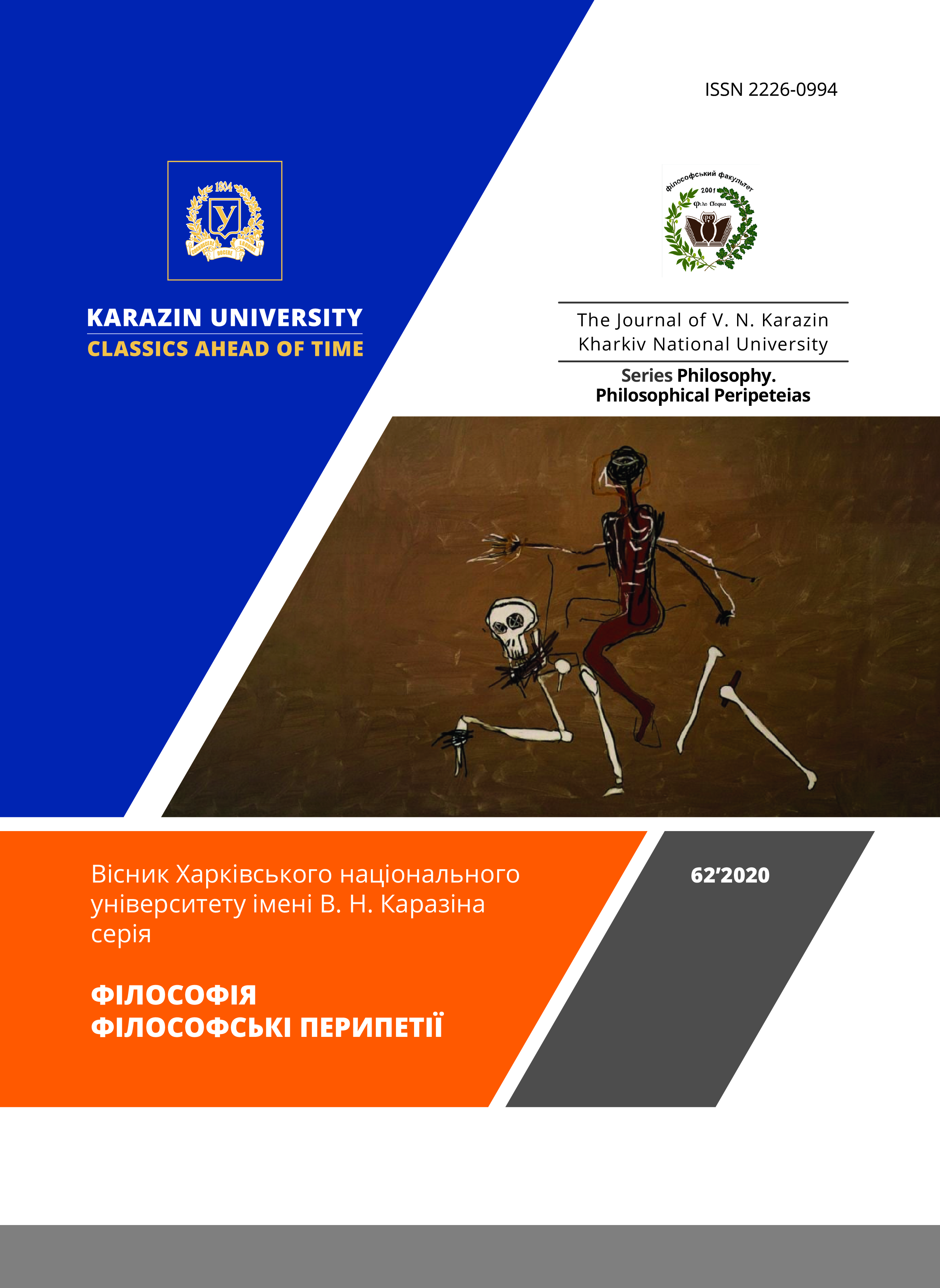TO THE QUESTION OF THE NATURE OF CONSCIENCE. CRISIS OF CONSCIENCE
Abstract
This article is dedicated to understanding the nature of conscience, its essential manifestations and features. Conscience is the “core” of a person’s moral life. The conscience acts activate and accumulate the internal energies of the person, which help him/her to be fully connected with the world and to carry out a thorough evaluation of both his/her actions and Others. Therefore, the phenomenon of conscience is inextricably linked to the freedom of a person and his/her efforts to exercise himself/herself as a Human, to find his/her own inner voice. Despite its intimacy, conscience never closes within the limits of individual existence, but has unconditional openness to the world, is a keen awareness of responsibility for our actions. Conscience is a testament of the fact that, at a deep (implicative) level, we are rooted in, and inextricably linked to, one Reality. As a result of critical analysis, it is argued that conscience emerges as an internal potentiality of a person, a continuous process of self-determination and formation. Conscience is dialectic in nature, combining internal/external, individual/social, subjective/objective, rational/irrational aspects. The complexity of the phenomenon is manifested in the attempts to symbolically identify it as Call, Witness, Demon, Worm, Judge, etc. Conscience is impossible outside the dialogue of the person with himself/herself and Others, because in the communication process the inner growth and formation of the person take place. Conscience defines a “coordinate system” within which a person’s life moves and divides the line between Good and Evil, Real and Ideal, Existent and Desired. Accordingly, conscience is ideal in essence and is an indispensable structure of human consciousness, linked to the boundary questions of a person regarding his/her own nature.
Downloads
References
/References
Apresyan, G. (2018). Conscience. In New Philosophical Encyclopedia. Retrieved from https://iphlib.ru/library/collection/newphilenc/document/HASH0186d368b06fab3bed4e2d86. (In Russian).
Aristotel. (2000). Politics. (O. Kysliuk, Trans.). Kyiv: Osnovy. (In Ukrainian).
Edmonds, D. (2016). Would you Kill a Fat Man? The Trolley Problem and What Your Answer Tells Us About Right and Wrong. (D. Kralechkin, Trans.). Moscow: Gaidar Institute Publishing house. (Original work published 2013). (In Russian). DOI of Original: https://doi.org/10.1515/9781400848386.
Franz, R. (2002). Crisis of Conscience. Atlanta: Commentary Press.
Fromm, E. (1992). Man for Himself: An Inquiry into the Psychology of Ethics. Minsk: Collegium. Retrieved from http://psylib.org.ua/books/fromm04/txt08.htm. (Original work published 1947). (In Russian).
Giubilini, А. (2016). Conscience. In Stanford Encyclopedia of Philosophy. Retrieved from https://plato.stanford.edu/entries/conscience.
Hitlin, S. (2008). Moral Selves, Evil Selves: The Social Psychology of Conscience. New York: Palgrave Macmillan. DOI: https://doi.org/10.1057/9780230614949.
Huntington, S. (2003). The Clash of Civilizations and the Remaking of World Order. (T. Velimeev, Trans.). Moscow: AST. (Original work published 1996). (In Russian).
Ilyin, E. (2016). Psychology of Conscience. Guilt, Shame, Remorse. Saint Petersburg: Piter. (In Russian).
Langston, D. C. (2001). Conscience and Other Virtues: From Bonaventure to MacIntyre. University Park: The Pennsylvania State University Press.
Plato. (2006). Protagoras. (V. S. Soloviev, Trans.). In Plato, The Collected Writings: In 4 Vols. (Vol. 1, pp. 193–261). Saint Petersburg: Saint Petersburg University Publishing House; Oleg Abyshko’s Publishing House. (In Russian).
Schinkel, A. (2007). Conscience and Conscientious Objections. Amsterdam: Amsterdam University Press. DOI: https://doi.org/10.5117/9789085553915.
Seneca, L. A. (1977). Moral Letters to Lucilius. (S. A. Osherov, Trans.). Moscow: Nauka. (In Russian).
Twardowski, K. (2016). Ethics and its Relation to the Theory of Evolution. In K. Twardowski, Selected Works (pp. 72–88). Lviv: Lviv Society named after K. Twardowski. (In Ukrainian).
Апресян Г. Совесть. (Новая философская энциклопедия). 2018. URL: https://iphlib.ru/library/collection/newphilenc/document/HASH0186d368b06fab3bed4e2d86.
Арістотель. Політика / пер. з давньогр. та передм. О. Кислюка. К.: Основи, 2000. 239 с.
Ильин Е. Психология совести. Вина, стыд, раскаяние. СПб: ООО Издательство «Питер», 2016. 288 с.
Платон. Протагор / пер. с древнегреч. В. С. Соловьева; печ. по изд. Платон. Собрание соч.: в 3-х т.; т. 1. М.: Мысль, 1968. Платон. Сочинения: в 4-х т.; т. 1. СПб.: Изд-во С.-Петерб. ун-та; Изд-во Олега Абышко, 2006. С. 193–261.
Сенека Л А. Нравственные письма к Луцилию / пер. С. А. Ошерова; отв. ред. М. Л. Гаспаров. М.: Наука, 1977. 384 с.
Твардовський К. Етика та її відношення до теорії еволюції. Твардовський К. Вибрані праці. Львів: Львівське товариство імені К. Твардовського, 2016. С. 72–88.
Фромм Э. Человек для себя. Исследование психологических проблем этики / пер. Л. А. Чернышевой. Минск: Коллегиум, 1992. 253 с.
Хантингтон С. Столкновение цивилизаций / пер. с англ. Т. Велимеева. Ю. Новикова. М.: ООО Издательство АСТ, 2003. 603 с.
Эдмондс Д. Убили бы вы толстяка? Задача о вагонетке: что такое хорошо и что такое плохо? / пер. с англ. Д. Кралечкина. М.: Изд-во Института Гайдара, 2016. 256 с. DOI оригинала: https://doi.org/10.1515/9781400848386.
Franz R. Crisis of Conscience. Atlanta: Commentary Press, 2002. 440 p.
Giubilini А. Conscience (Stanford Encyclopedia of Philosophy). 2016. URL: https://plato.stanford.edu/entries/conscience.
Hitlin S. Moral Selves, Evil Selves: The Social Psychology of Conscience. New York: Palgrave Macmillan, 2008. 269 p. DOI: https://doi.org/10.1057/9780230614949.
Langston D. C. Conscience and Other Virtues: from Bonaventure to MacIntyre. University Park: The Pennsylvania State University Press, 2001. 191 p.
Schinkel A. Conscience and Conscientious Objections. Amsterdam: Amsterdam University Press, 2007. 638 p. DOI: https://doi.org/10.5117/9789085553915.

This work is licensed under a Creative Commons Attribution 4.0 International License.
Authors who publish with this journal agree to the following terms:
- Authors retain copyright and grant the journal right of first publication of this work under the terms of a license Creative Commons Attribution License 4.0 International (CC BY 4.0).
- Authors are able to enter into separate, additional contractual arrangements for the non-exclusive distribution of the journal's published version of the work (e.g., post it to an institutional repository or publish it in a book), with an acknowledgement of its initial publication in this journal.
- Authors are permitted and encouraged to post their work online (e.g., in institutional repositories or on their website) prior to and during the submission process, as it can lead to productive exchanges, as well as earlier and greater citation of published work.






3.gif)




